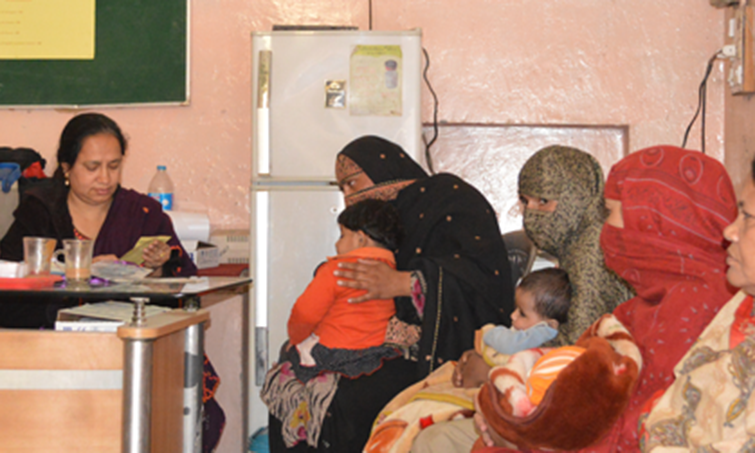
By Wasif Mahmood
Mohallah Shafiqabad, Lahore, 1 April 2016 – Some are babbling while others crying their lungs out, a large number of children along with their parents crowded the newly set up immunization centre in the heart of the densely populated urban slum Union Council (UC) 69 in Lahore, as a health worker vaccinates them against different childhood diseases.
“It is difficult for me to see my child undergoing the pain of the injection, but knowing that preventive vaccines save children from diseases, I believe the pain is worth it”, says mother of Ejazur Rehman, a toddler receiving his third vaccination dose at the centre.
The centre has been set up with community support to help ensure no child in UC 69 which is considered a high risk in the fight against polio go unvaccinated.
An area is declared high risk for polio considering several factors – presence of the polio virus in the sewage and water, history of polio cases, ongoing movement of populations travelling to and from infected districts, poor water and sanitation conditions as well as low routine immunization coverage.
Unfortunately, all these factors converge at UC69. Located just across Lahore-Islamabad section of Motorway near Bund Road, Lahore, Pakistan’s second biggest city after Karachi, UC has no health facility.
In a population of 64,000, more than 10,000 account for children under five, 3,000 of which are under two years of age. Over 2,000 of these children are more vulnerable due to their frequent movement to polio infected districts, less opportunities to continue education, lack of access to improved sources of drinking water as well as lack of sanitation facilities and poor hygiene.
“We cannot afford sending our children to school. My eldest son Ali who is four years now has not attended any formal school. He just goes to a nearby coaching centre in the eveningto learn reading and writing”, mother of Ejaz says.
“Years back our family migrated to Pakistan from Afghanistan travelling all the way to Punjab via Peshawar, Khyber Pakhtunkhwa”, she says.
“My husband is a labourer and earns Rs. 500 per day. It is not possible for him to send our children to school or take them to the hospital for vaccination which is located far away”, she retorts.
“This centre is easily accessible to us. We do not have to cross the main road”, the mother of three says.
The centre has been established after locals were approached by the Communication Network; a social mobilization force supported by the UNICEF for community engagement. After a brief discussion,an influential member of UC 69 agreed to allocate a hall which is now up and running since January on partnership basis – human resource and appliances like fridge for vaccine storage being provided by the government, expenses of electricity being borne by the community, and the responsibility of social mobilization has been taken up by the polio eradication partners.
In addition to deploying two vaccinators, the government has deputed Aneeda Khalid as in-charge of the centre during polio vaccination campaigns. This is to ensure that when vaccinators are busy in the national immunization days, the routine immunization of children is not affected. She is a trained Lady Health Visitor (LHV), who has undergone two year vaccination course, and has 26-year experience of working in health department.
“This is a new place and community does not have any idea about its location. So we use folk media like mosque announcements and social mobilization as a tool to inform parents”, says Khalid.
“Social Mobilizers and Female Community Mobilizers play an important role by going door to door to persuade parents to vaccinate their children on time free of cost at the centre”, the LHV says.
Polio eradication partners, including UNICEF, have provided this valuable support to the government with deployment of 42Female Community Mobilizers (FCM) in Lahore, 27 of them work in UC69.
The FCMs prepare a list of all children who have not receive any vaccine in the area and provide information about location, day, date and time for routine immunization to the community. They coordinate with the in-charge of immunization site on identifying children who due for vaccination and ensure all are vaccinated, thus ensuring better health for the children of the community.
“Very often parents do not adhere to routine immunization schedule. We emphasise on the parents to ensure timely vaccination as this is the only way their child can be fully protected against all preventable diseases”, FCM Nazneen says.
Thanks to strong government accountability, ownership as well as civil society engagement, Punjab has largely been polio free in 2015. Now the province has taken the fight to a new level by shifting the focus on the broader challenge of synergy with Expanded Programme on Immunization.
The magnitude of this new challenge is amplified by the January Polio Control Room data which indicates over 62,000 children who have not received a single vaccination since birth.
However, Abdul Sattar, vaccinator at UC69, is confident that with the support of partners 100 per cent routine immunization coverage is possible.
“There is a visible change today. Soon after female mobilizers started engaging the community, this centre has sprung to life. You can see parents waiting for their turn to get their children vaccinated. Hopefully soon there will be no child left without full protectionagainst all diseases”, he adds saying, “the efforts must go on”.
